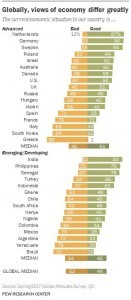A Pew Research Centre report showed that people in most advanced economies were overall optimistic about the current economic conditions in their nations, except Greece which was last with 98% responding the situation was bad. Nearly a decade after the worst economic downturn since the Great Depression, economic spirits are reviving. Many Europeans, Japanese and Americans feel better today about their economies than they did before the financial crisis. More broadly, in 11 of 18 countries from across the globe that were surveyed in both 2016 and 2017, publics feel more positive about their economy than they did a year ago. The Dutch, Germans, Swedes and Indians see their national economies in the most positive light. While global publics are increasingly upbeat about economic conditions, the overall view of the economy is still in negative territory in many countries. Overall, a median of only 46% in the 32 nations surveyed this year say their current economy is doing well.
In France, Germany, Italy, Poland and the United Kingdom, a median of 51% now give their economy a positive grade. This comes in the wake of an average 1.7% growth in 2016 in the five European Union countries and an unemployment rate of 7.4%. The public’s view of the economy is up from a low of 15% across the five EU nations in 2013, when their economies grew at an annual average of only 0.6% and joblessness stood at 9.0%. In 2007, a median of 36% in those countries said their economic situation was good.

Publics in advanced economies are quite pessimistic about young people’s financial prospects, just 34% believe they will be better off than the current generation. Such despair is particularly strong in Greece, Japan, France, Australia, Canada, Spain and the UK, where roughly seven-in-ten people say today’s children will be worse off.
see full report here
Ask me anything
Explore related questions





